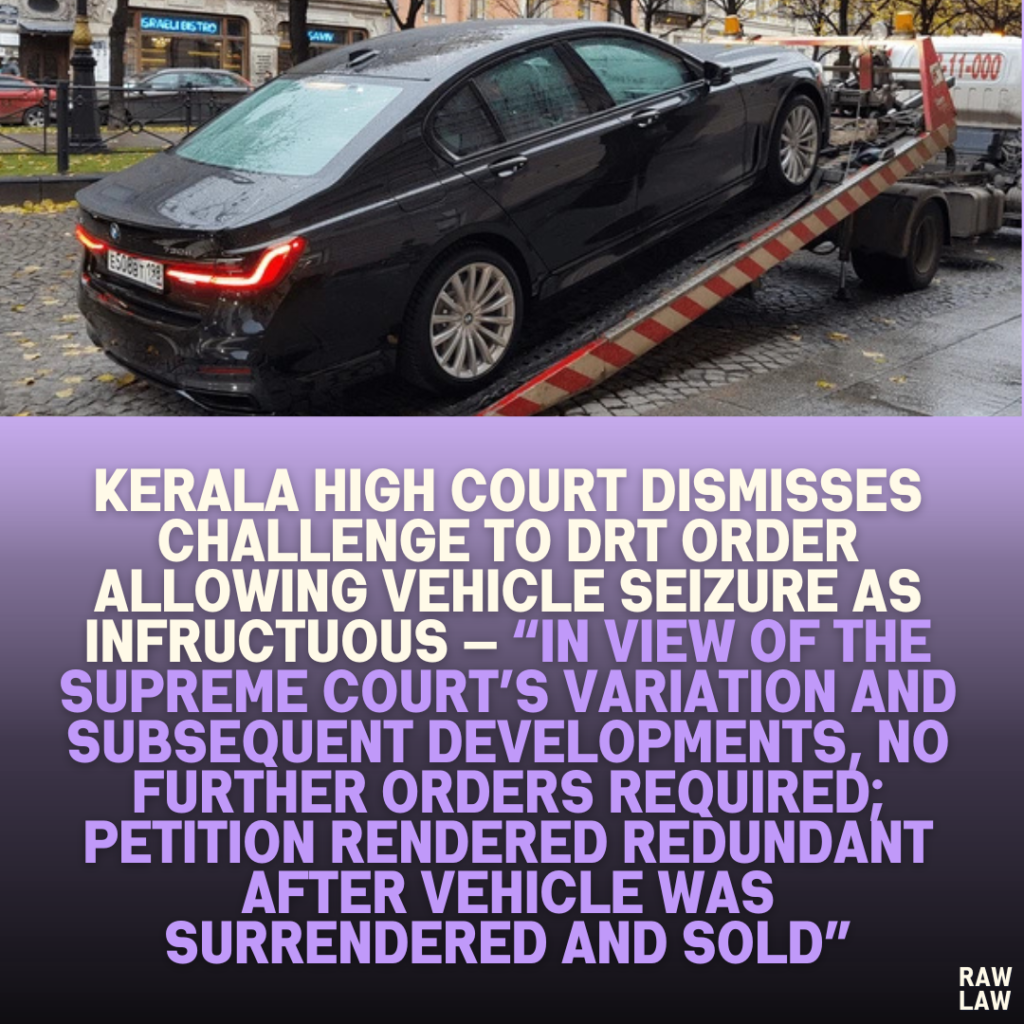Court’s Decision
The Kerala High Court dismissed the Original Petition (DRT) No. 254 of 2023, which challenged the DRT-II’s order permitting the appointment of an Advocate Commissioner to seize the petitioner’s vehicle. The Court observed that the Supreme Court, in SLP (C) No. 20387/2023, had already permitted the Advocate Commissioner to proceed in accordance with law. Additionally, since the petitioner had surrendered the vehicle and it had already been sold by the bank, the Court held that:
“Nothing further remains to be considered in this original petition, and the same is disposed of, leaving open all the contentions of the parties to be agitated before the Tribunal.”
Facts
- The petitioner had challenged an order (Ext. P6) dated 23.06.2023 passed by the Debts Recovery Tribunal-II, Ernakulam, in I.A. Nos. 1966 and 1967 of 2023 in O.A. No. 349 of 2023.
- The DRT order allowed the appointment of an Advocate Commissioner to seize a vehicle (described as ‘B’ schedule property) and place it in the interim custody of the bank.
- The High Court initially stayed the execution of this order on 07.07.2023.
- However, in SLP (C) No. 20387/2023, the Supreme Court varied the High Court’s stay order and clarified that:
“We permit Advocate Commissioner to proceed in accordance with law… all rights and contentions of the parties are left open.”
- Subsequently, the petitioner surrendered the vehicle and the bank sold it.
- The original application (O.A. No. 349/2023) remains pending before the Tribunal.
Issues
- Whether the DRT was justified in appointing an Advocate Commissioner to seize the petitioner’s vehicle.
- Whether the High Court’s interim stay order against seizure continued to have effect post the Supreme Court’s intervention.
- Whether any relief could still be granted in light of the surrender and sale of the vehicle.
Petitioner’s Arguments
- The petitioner argued that the DRT’s order permitting seizure of the vehicle was unjustified and violated legal procedures.
- It was submitted that the bank acted prematurely and without considering the objections raised in the counter affidavits.
Respondent’s Arguments
- The bank submitted that the vehicle had already been voluntarily surrendered and was subsequently sold.
- It was also pointed out that the Supreme Court had permitted the Advocate Commissioner to proceed in accordance with law, rendering the petition infructuous.
- The respondents emphasized that the original application before the Tribunal was still pending, and that all issues could be addressed therein.
Analysis of the Law
- The Court noted that the Supreme Court’s order dated 15.07.2024 had overridden the interim stay granted by the High Court.
- The Apex Court left all contentions open and permitted lawful continuation of the seizure process.
- As the surrender and sale of the vehicle was a subsequent development, the High Court determined that no purpose would be served by continuing the original petition.
Precedent Analysis
- The judgment does not cite or rely on any prior case laws or precedents.
- However, the High Court deferred to the Supreme Court’s directive permitting lawful continuation of the Commissioner’s actions.
Court’s Reasoning
The High Court reasoned that:
- The Supreme Court had already allowed the Advocate Commissioner to act.
- The vehicle was surrendered voluntarily and had been sold.
- The issues raised in the petition could still be agitated before the Debts Recovery Tribunal since the original application was pending.
Accordingly, the petition was rendered infructuous.
Conclusion
The Kerala High Court dismissed the Original Petition (DRT) No. 254 of 2023 in light of the Supreme Court’s directions and the factual development of surrender and sale of the vehicle. It concluded:
“Nothing further remains to be considered… all the contentions of the parties are left open to be agitated before the Tribunal.”
Implications
- The case underscores the binding nature of Supreme Court directives even on pending High Court proceedings.
- It reiterates that factual developments such as surrender or settlement can render writ petitions infructuous.
- The decision emphasizes that the DRT remains the appropriate forum to adjudicate substantive disputes arising under the Recovery of Debts laws.



